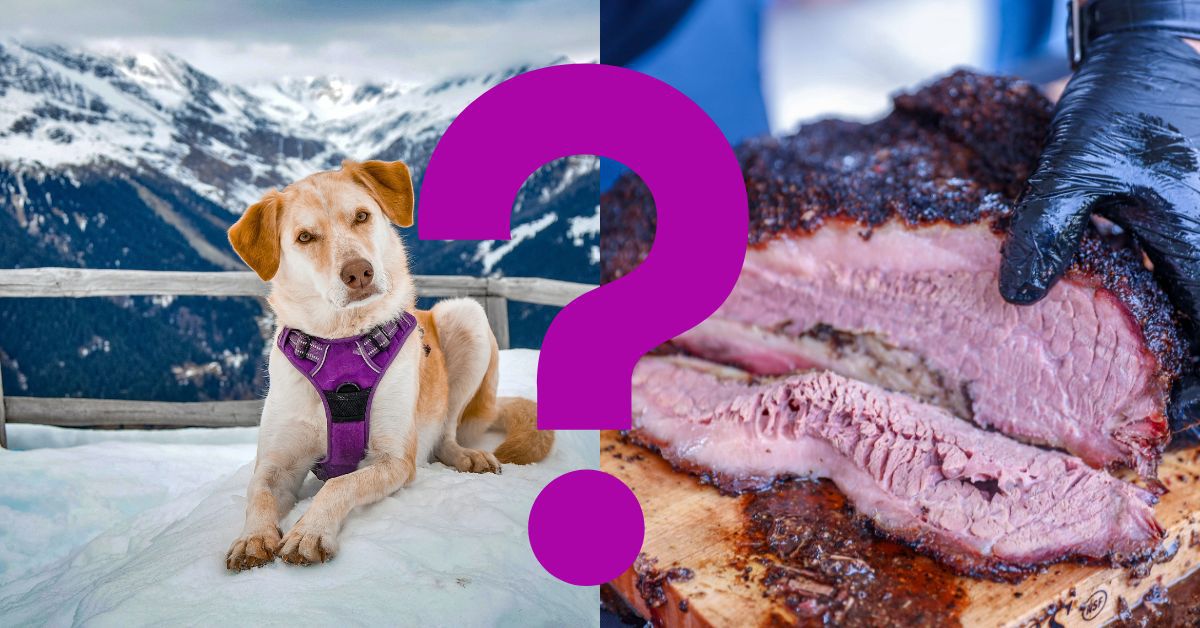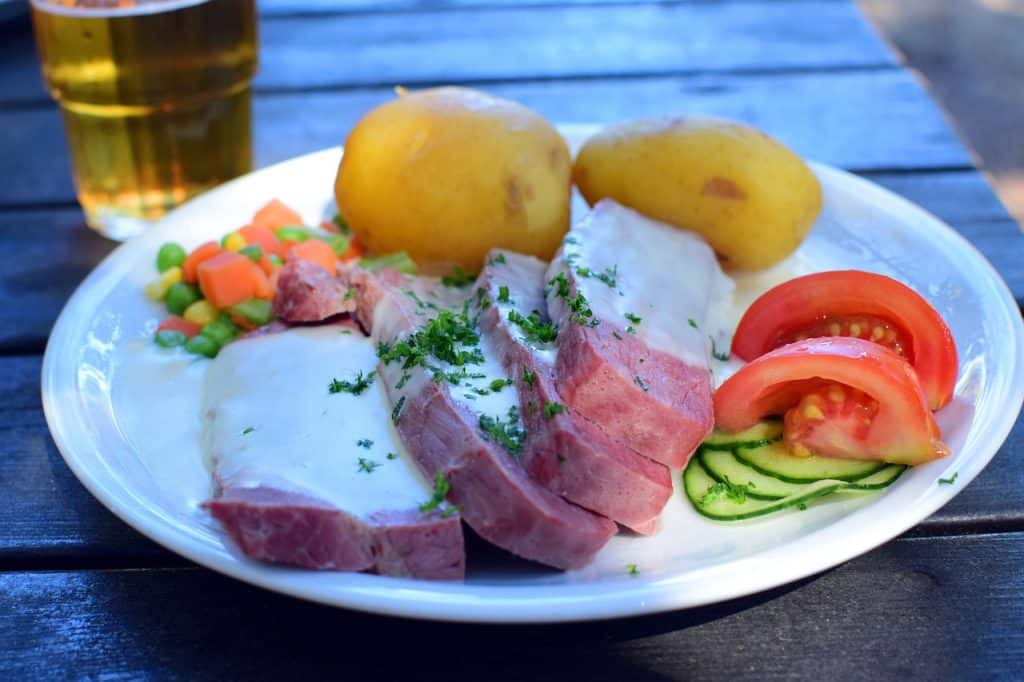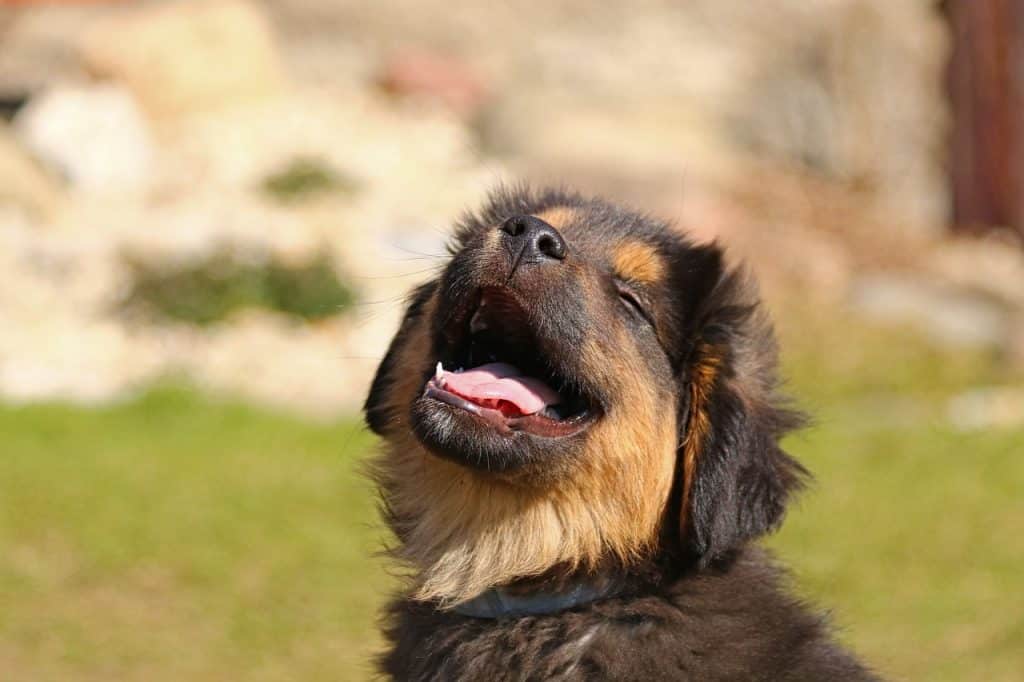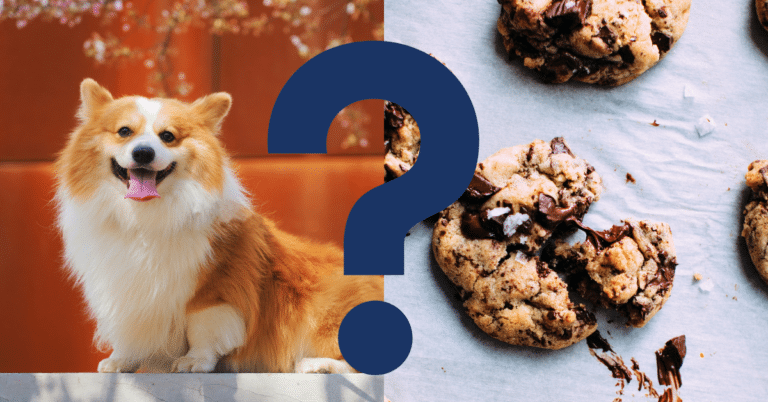Can Dogs Eat Brisket? A Vet’s Opinion

Brisket is a cut of beef from the animal’s lower chest or breast area commonly used in barbecue, but can you feed brisket to your dog?
In moderation, dogs can eat plain cooked brisket. Remove any seasonings, spices, or sauces that are potentially dangerous. Brisket is high in protein and fat, so it’s ideal as a treat rather than a regular part of their diet. Before introducing new foods to your dog’s diet, please consult your veterinarian to ensure their safety.
Benefits of Brisket for dogs
Brisket, a beef cut obtained from the lower chest or breast portion of cattle, might provide specific nutritional benefits to dogs when consumed in moderation and appropriately prepared. Here are some crucial points to consider:
Protein
Brisket is high in protein, necessary for the growth, repair, and maintenance of a dog’s body’s tissues, muscles, and cells. Protein is essential for a dog’s overall health and a robust immune system.
Amino Acids
Beef proteins, such as brisket, include essential amino acids that dogs cannot make alone. These amino acids are required for various body processes, including tissue development and repair, enzyme and hormone production, and immune system support.
Vitamins and minerals
Beef, notably brisket, contains essential vitamins and minerals such as B vitamins (B12, B6, niacin), zinc, phosphorus, and iron. These nutrients benefit a dog’s overall health by assisting with energy metabolism, bone health, and red blood cell development.
Energy Source
Brisket’s fat content is an energy source for dogs, giving them the fuel required for everyday activities and functions. However, being aware of the fat level is critical since excessive fat consumption can lead to obesity and other health problems.
Palatability and Variety
Including brisket as a treat can help diversify a dog’s diet, making meals more appealing and pleasurable. It benefits dogs who are fussy eaters or require encouragement to eat regular meals.
Enhanced Coat and Skin Health
Omega-3 and omega-6 fatty acids in beef can benefit a dog’s coat and skin health, producing a lustrous coat and reducing skin dryness or irritation.
Despite these possible advantages, it is critical to exercise caution and follow recommendations when giving brisket to dogs. Serve plain, cooked brisket with no seasonings or additives, as confident regularly used components in preparation can be toxic to dogs. Furthermore, portion control is essential to avoid excessive calorie and fat intake, as too much fat can contribute to obesity and other health problems. Consultation with a veterinarian is always recommended before adding brisket or any new food into a dog’s diet to ensure it corresponds with its nutritional needs.

How to safely give brisket to dogs
If done carefully and in moderation, feeding brisket to your dog can be a great treat. Here’s how to feed brisket to your dog safely:
Cooking & Preparation
Ensure that the brisket is plain, cooked, and free of any seasonings, spices, onions, garlic, or other things that could be toxic or hazardous to dogs. Avoid salt, pepper, or other flavorings, as too much sodium can harm a dog’s health.
Excess Fat Removal
Before cooking, remove any excess fat from the brisket. While fat provides energy, too much can create digestive problems and contribute to dog obesity.
Methods of Cooking
Boil, bake, or grill the brisket without using oils or fats. No marinades or sauces should be used. It is frequently the safest and healthiest way to cook it for dogs to boil or bake it.
Portion Management
Take care with the amount of food you offer your dog. Brisket should be a minor component of their overall diet, not a significant source of nutrition. Most dogs can eat little, bite-sized bits or shreds.
Stay away from bones
Make sure there are no bones in the brisket. Cooked bones in dogs might shatter and cause choking or intestinal obstructions.
Examine Digestive Response
Give your dog a bit of brisket and watch how their digestive system reacts. If your dog exhibits symptoms of upset stomach, diarrhea, or other bad reactions, avoid giving them brisket in the future.
Moderation and frequency
Brisket should be used as a treat only, not as a regular part of your dog’s diet. Because of the high-fat content, too much can irritate their stomach or lead to obesity.
Consult a Veterinary Surgeon
Consult your veterinarian before adding brisket or new food to your dog’s diet. They can offer advice based on your dog’s health requirements, allergies, and dietary restrictions.
Serve with caution
Always offer brisket in a dog-friendly bowl or dish, and make sure it’s at a safe temperature for your dog to eat. Avoid offering your dog heated food that could burn their tongue.
Remember that each dog is unique, and what works for one may not work for another. The idea is to gradually introduce new meals like brisket in moderation and under the guidance of a veterinarian. This way, you can prioritize your dog’s health and well-being while enabling them to enjoy a delightful reward.
Will brisket make a dog sick?
If not prepared and administered safely and suitably, feeding brisket to dogs can result in various health problems. Here are some of the potential illnesses or health issues that can result from feeding brisket to dogs:
- Gastrointestinal Discomfort: Rich or fatty foods, such as brisket, can cause gastrointestinal disturbance in dogs, resulting in symptoms such as vomiting, diarrhea, stomach cramps, or abdominal pain.
- Pancreatitis: Brisket’s high-fat content can cause pancreatitis in some dogs, resulting in vomiting, diarrhea, loss of appetite, and abdominal pain.
- Obesity: Brisket is high in fat, and if not consumed in moderation and as part of a balanced diet, it can contribute to weight gain and obesity in dogs.
- Imbalance In Diet: Suppose brisket becomes a substantial part of a dog’s diet without proper quantity control and a balanced nutritional plan. In that case, it may cause an imbalance in their diet, leaving them deficient in critical nutrients.
- Choking Risk: Brisket bones or fragments can constitute a choking hazard or induce gastrointestinal obstructions, resulting in significant health complications or surgical intervention.:
- Reactions To Allergens: Some dogs may be allergic to specific proteins or components found in beef, particularly brisket, which can cause skin rashes, itching, swelling, or digestive difficulties.
- Sodium Excess: Seasoning or utilizing salts in brisket preparation can induce a sodium overload, resulting in extreme thirst, increased urine, and potentially deadly electrolyte imbalances.
- Seasoning Toxicity: If the brisket is seasoned with onions, garlic, or other harmful components for dogs, it might result in poisoning and other adverse health repercussions.
When feeding brisket or any other human food to dogs, it is critical to exercise caution and adhere to safe practices. To protect your dog’s safety and well-being, always speak with a veterinarian before introducing new items to their diet. Make your dog’s diet tailored to their needs, health issues, and nutritional requirements.
Can Dogs Eat Brisket Variations?
Plain, cooked brisket can be consumed in moderation by dogs as long as it is prepared securely and without any dangerous additions. When giving brisket alternatives, however, caution is advised. Here are various variants and concerns for brisket:
Smoked Brisket
Smoked brisket frequently contains spices, rubs, or wood flavorings that dogs may not tolerate. Furthermore, smoking can introduce excess salt and other detrimental elements to dogs. It is advisable not to feed smoked brisket to dogs.
Marinated Brisket
Brisket marinated in various sauces or seasonings may contain harmful components such as onions, garlic, or other spices. Always give your dog plain, unseasoned, and unmarinated brisket.
Brisket with Sauces
Dogs should not be served brisket dishes with sauces, gravies, or condiments. These sauces may contain toxic substances such as onions, garlic, salt, or other chemicals.
Brisket Bones
Cooked bones, including brisket bones, can shatter and cause gastrointestinal obstructions in dogs. It is safer to avoid offering dogs bones.
Fatty Brisket
Brisket is a fatty cut of meat, and too much fat can cause gastrointestinal discomfort, pancreatitis, or obesity in dogs. Trim any surplus fat and provide lean amounts in moderation.
Always prioritize your dog’s safety and well-being by providing plain, cooked brisket without seasoning, spices, sauces, or bones. Please consult your veterinarian before introducing any variation of brisket or other human foods to your dog to ensure it is safe and appropriate for your dog’s individual dietary demands and health conditions.

Vet’s Summary
In conclusion, dogs can take plain, cooked brisket in moderation because it contains vital protein and minerals. However, versions such as smoked, marinated, or sauced brisket should be avoided because they may contain toxic substances such as spices, sauces, or high quantities of salt. Bones and excessive fat should be avoided to avoid choking hazards and gastrointestinal difficulties. Always prioritize plain and unseasoned brisket to preserve your dog’s safety and well-being.
Given the potential gastrointestinal issues that rich or varied foods like brisket might offer for dogs, dog owners should think about introducing probiotic pills into their dog’s diet. Probiotics can help maintain a healthy gut flora and improve digestion, potentially alleviating any gastrointestinal issues caused by eating new or more nutritious meals. Consult a veterinarian to select a suitable probiotic supplement and dosage for your dog’s needs and digestive health. This extra step can help your dog’s digestive health and provide a seamless transition when introducing new foods, especially treats like brisket.
Videos to watch
If you are wondering what related foods are good to give your dog, watch this:
And if you want to know what a dog can NOT eat, watch this:






